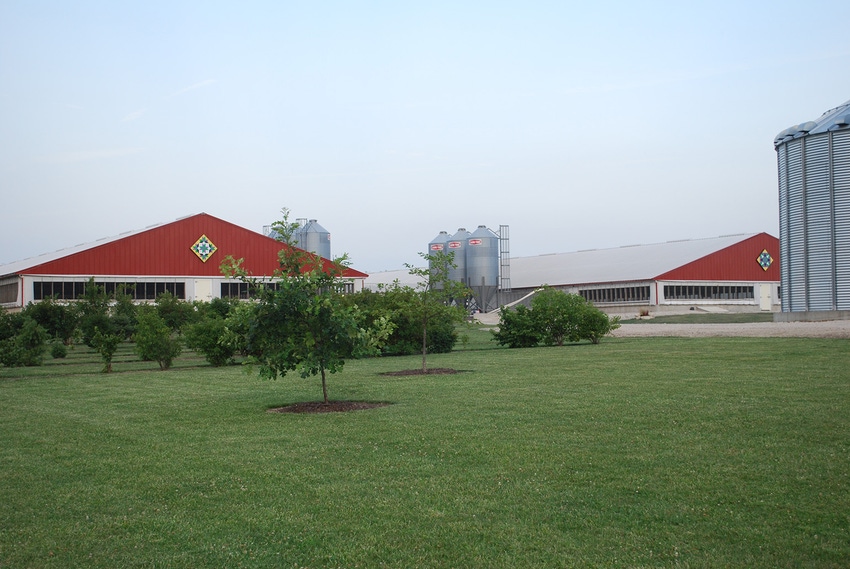We have long been told that we need to “tell” our stories of hog production, but we can’t forget about “showing” our story to win the public perception game.

You’re being watched.
Unless you have been hiding under a rock, you should realize that you and your farming operation are under constant scrutiny by your neighbors and the general public as a whole. Pork producers have long had a target on their collective back, with someone at every turn wanting to put them out of business.
Hog concentration, and the smells that come along with it, has created problems for the industry as farmland has been encroached upon by urban sprawl. Long has the story been told of our urban friends wanting a part of the good life, moving out of the rat-race of the city for a serene spot in the country.
Feeling they have found their modern-day Eden, they feel their Utopia has been abruptly violated when they wake up to the sights, sounds and smells of modern agriculture. They feel their dreams of a Norman Rockwell existence are shattered the first time their new neighbors are fertilizing the near-by crop field with liquid gold from the hog facility.
It doesn’t matter that the hog farm has long been established in the area, as we are learning from North Carolina courts that have recently sided with the urban dream-seekers. All of these producers are doing their business the best that they know how. But as we have learned, the court of public opinion or even the court of law may not care about the best management practices of modern-day agriculture. If some non-farm person feels violated, there will be a fight.
All ag producers can do a lot to help themselves if they take a step back and look at their operation with an unbiased eye. I was once told by a hog producer that he worked on his farm as if someone had a large parabolic microphone such as those found on the sidelines at football games.
In the hog farm setting, such surveillance could capture all the sounds from the hog barn, including the producer trying to coax market animals from the pen onto the semi. We have seen what havoc some ne’re-do-wells can do when they capture undercover video of modern practices in the barns, but when creatively spliced together can put a black eye on the operation and the entire U.S. hog industry.
The court of public opinion can be developed without the need for special recording devices, as a lot of what producers do is on public display well within view of passersby.
Rick Martens, executive director of the Minnesota Custom Applicators Association, spoke at the recent North American Manure Expo in Brookings, S.D., and stressed the importance of creating a positive public perception. His presentation was geared toward custom manure applicators, but a lot of his message translates to any livestock producer.
Martens speaks from 35 years as a custom applicator. In that time, he has seen the manure handling game change, as well as the livestock industry in the country. “If you’re around an industry you recognize and see what’s going on,” Martens says, “but if you’re not familiar with it, you don’t. … some people smell manure, and say ‘that’s the smell of money,’ while others feel it’s offensive. We need to balance that some way.”
Public perception is a fickle thing. Not everyone passing by your farm will stop to find out the whole story, so the image that you present to the passing world can go a long way in forming public perception, in a positive way. “Public perception can become public policy,” Martens says, “it doesn’t matter if it’s right or wrong, but if you get enough people behind it, it becomes public policy.”
People base their perspective on sights, sounds, touch, smell, past experience and if they have city or rural roots. Public perception of farmers is often based on first impressions, and you’ve only got one shot, so make the best of it.
Again, Martens speaks of the manure application business, but his thoughts translate well to livestock producers, as well. “What do people see when you are working?” he asks, and he provides a checklist to follow.
Appearance
Equipment
• In good repair
• Reasonably clean
• Safety lighting
Personnel
• Appropriately dressed
• Uniforms
• Courteous
• Knowledgeable
At the end of a job, whether it’s applying manure, or hauling out a load of market hogs, you need to ask yourself “what does the job site look like when we leave?” Martens says custom applicators should ask themselves, “when neighbor goes by, does it look like you’re doing the right thing?”
Communication is often an integral, and maybe the most important, part of developing positive public perception. As a custom applicator, proactive communication with the farmer, neighbors and local government officials can make the entire job go more smoothly. Same can be said of producers. “If you’re going to be spreading manure, let the neighbors know, in case they are planning a family reunion or something on the upcoming weekend,” Martens says.
Balancing farming the right way with openly communicating the “what,” “why” and “when” you are doing certain practices can go a long way in smoothing over neighbor and public relations.
We have been told that as producers we need to “tell” our stories, but nowadays in may be just as important to “show” our story.
About the Author(s)
You May Also Like



